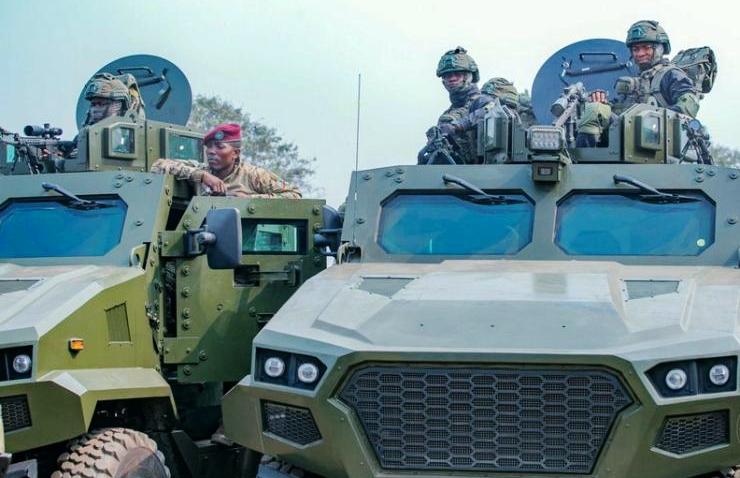African military spending rose by 22% between 2022 and 2023, according to a new report, with the Democratic Republic of Congo (DRC) seeing the biggest increase to its military budget globally at 105% as the central African country battles multiple security threats.
The Stockholm International Peace Research Institute (SIPRI), in a new report on world military spending, found that the DRC saw the largest percentage increase in military spending – 105% – by any country in 2023 – greater even than Ukraine. There has been and is protracted conflict between government and non-state armed groups in the Central African country, with an estimated 200 militias and armed groups operating in the region, as well as Red Tabara rebels aiming to destabilise neighbouring Burundi.
In 2023 the DRC’s military spending more than doubled to reach $794 million. The 2023 increase coincided with growing tensions with Rwanda, a surge in clashes with non-state armed groups, and a move by the government to strengthen the DRC’s armed forces after it demanded the early withdrawal of a large-scale United Nations peacekeeping mission in the country. This is being replaced by the Southern African Development Community (SADC) Mission in Mozambique (SAMIDRC), which includes South African troops.
South Africa has emerged as a key supplier to the DRC, with Paramount delivering 25 Maatla armoured personnel carriers (APCs) to the DRC police in 2023, and 20 Mbombe 4 APCs to the DRC military in early 2023. The Democratic Republic of Congo is also acquiring aircraft from Paramount, and is receiving six Mwari intelligence, surveillance and reconnaissance (ISR) platforms.
Last year it emerged that the DRC had acquired nine CH-4 unmanned aerial vehicles (UAVs) from the China Aerospace Science and Technology Corporation. Other recent deliveries include 30 Calidus MCAV-20 armoured vehicles from the United Arab Emirates, various new small arms and light weapons from various suppliers, and seven second hand OH-58 and UH-1H helicopters from the United States.
Africa Intelligence earlier in May indicated the DRC will be acquiring 185 Hizir armoured personnel carriers from Turkey’s Katmerciler this year under a $75 million agreement.
Reports suggest that Felix Tshisekedi’s government has approved an ambitious military spending plan, worth $3.5 billion from 2022 to 2025, after the United Nations eased an arms embargo on the country in 2022. The DRC is looking to buy weapons from suppliers around the world, ranging from Indonesia to Russia.
As a whole, African military spending totalled $51.6 billion in 2023, which was 22% higher than in 2022 and 1.5% higher than in 2014, SIPRI reported.
The rise in 2023 can be attributed to the 20% increase in spending by Nigeria — the subregion’s biggest military spender — and notable increases in spending by several other countries including the DRC and South Sudan.
Nigeria’s military spending was $3.2 billion in 2023. This included a supplementary budget that boosted the regular military budget by an additional 34%. The latest increase in Nigerian military spending comes against the backdrop of numerous ongoing security challenges.
South Sudan recorded the second highest percentage increase in military spending globally in 2023. Its spending rose by 78% to reach $1.1 billion, following a 108% increase in 2022. The growth in spending can be attributed to escalating internal violence and the security challenges that have spilled over from the civil war in neighbouring Sudan, SIPRI noted.
At $28.5 billion in 2023, military expenditure by North African countries was up by 38% from 2022 and by 41% from 2014. Algeria and Morocco are by far the largest spenders in the subregion, together accounting for 82% of North African military expenditure in 2023. Algeria’s military spending grew by 76% to reach $18.3 billion. This was the highest level of expenditure ever recorded by Algeria and the largest annual increase in its spending since 1974. The increase was facilitated by a sharp rise in revenue from gas exports to countries in Europe as they moved away from Russian supplies. In contrast, Morocco’s military spending decreased for the second consecutive year. It fell by 2.5% in 2023, to $5.2 billion.
Military expenditure in sub-Saharan Africa reached $23.1 billion in 2023, which was 8.9% higher than in 2022 but 22% lower than in 2014. SIPRI reported that world military expenditure rose in 2023 for the ninth consecutive year to an all-time high of $2 443 billion as war, rising tensions and insecurity manifest in various parts of the world.
“The unprecedented rise in military spending is a direct response to the global deterioration in peace and security. States are prioritising military strength, but they risk an action–reaction spiral in the increasingly volatile geopolitical and security landscape,” Nan Tian, Senior Researcher with SIPRI’s Military Expenditure and Arms Production Programme, said to coincide with the release of new data on global military spending. (Photo: Republican Guard soldiers with Calidus MCAV-20 armoured vehicles – Présidence RDC) – (Defence News)






